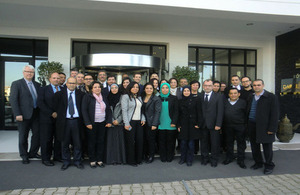OECD, with the support of UK embassy in Tunisia: The first general guide of public procurement designed for Tunisia
The Organisation for Economic Co-Operation and Development (OECD) organized in Tunis, on 20-21 January, a seminar designed to support the introduction of a more efficient and transparent public procurement system

The Organisation for Economic Co-Operation and Development (OECD) organized in Tunis, on 20-21 January, a seminar designed to support the introduction of a more efficient and transparent public procurement system. At the seminar, the OECD presented to staff of the State Secretariat in charge of Governance and Public Service, the Tunisian Anti-Corruption Agency and of the High Commission for Public Procurement, a new draft guide to public procurement which they had developed in cooperation with High Commission for Public Procurement (HAICOP), and with the support of the British Embassy in Tunis.
Following the seminar the guide will now be finalised, taking into account the views and recommendations of the seminar participants. Ultimately the guide will serve to support and reinforce key government reforms of every stage of the public procurement process (from the assessment of needs to tendering, management of contracts and payments). These reforms include the introduction of a new electronic public procurement system, TUNisia on line E-Procurement System, “TUNEPS”, which is designed to improve transparency and integrity in public procurement, particularly important because public procurement accounts for 18% of Tunisian gross domestic product (GDP).
The seminar was opened by Anouar Ben Khalifa, Secretary of State in charge of Governance and Public Service, who announced at the event that Tunisia had made an international pledge to publish an annual report on excesses recorded in signing and implementing public contracts. The secretary of state emphasized the point that “ good governance in public procurement will give a powerful push to the national economy”. Samir Anabi, president of Tunisian Anti-corruption agency, was one of the speakers during the event. He highlighted that the lack of transparency in public procurement was still one the main challenges that Tunisia had to overcome. and he underlined the importance of drafting new legislation to guarantee transparency in this area.
OECD is one of the partner organisations supported by UK’s “Arab Partnership program”. The program was launched in Tunisia during 2011 as a strategic response to the Arab Spring, the goal of which was to provide support to Tunisia, and other countries of the region, that are experiencing political transition.